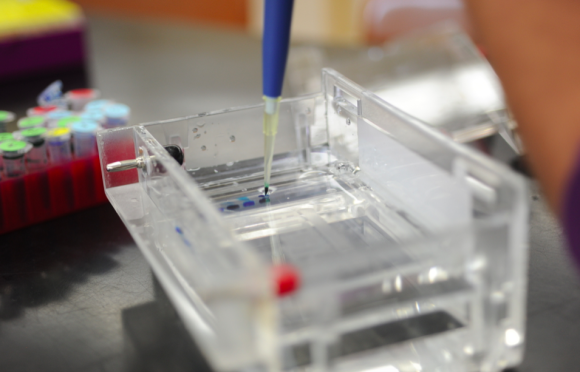China recently announced a new strategic plan, stipulating that the biotechnology sector should exceed 4% of gross domestic product by 2020, with 10 to 20 biomedical parks, valued at more than $1.5 billion (US). It’s one of many recent new developments to accelerate biotech research in China, and it’s having a ripple effect across East Asia. China’s One Belt and One Road Initiative to expand connectivity across Eurasia is opening up new opportunities throughout the region.
Take Hong Kong, for example. “Hong Kong is in a unique position and should be benefitted by all the new developments and initiatives from China,” says Dr. Lam Hon-Ming, a site director for ABE in Hong Kong. “Building a critical mass of biotechnologists is critical to Hong Kong.”
Indeed, creating the next generation of biotech workers is a critical need worldwide, with many countries looking to increase funding and expand opportunities. In the United States, for example, the National Institutes of Health announced it will award $190M in funding over the next 6 years for human genome editing.
Biotechnology is booming due to a unique convergence of factors. Not only do we have real-world pressing challenges that benefit from biotech solutions — such as new food and energy sources and medical treatments for a range of diseases — but we also have new tools at our disposal to understand our biological world. As a result, students have unprecedented opportunities to pursue various career paths within biotechnology.
Real-world science
Looking at a snapshot from biotech news in the first weeks of 2017, it’s clear the sector is rapidly advancing: researchers in China cloned a monkey for the first time ever; using the CRISPR gene editing tool, scientists corrected the Duchenne muscular dystrophy defect in heart tissue; and researchers successfully used a pocket-sized DNA reader to sequence the human genome.
These advancements represent just a sliver of the recent discoveries and achievements in biotechnology. From helping to preserve threatened plant and animal species to working to eliminate hunger worldwide, biotechnology is offering new solutions to range of societal challenges.
With these changes, students today face a future that is complex and uncertain. They are preparing for careers that, in many cases, do not yet exist. We must prepare students for the real world, equipping them with skills for adapting to new ideas and new settings.
To start, this means that biotechnology must be accessible to students worldwide. According to a recent U.S. survey by the Pew Research Center, half of American adults believe students don't pursue STEM degrees because the field is too difficult. Students, and their parents and teachers alike, must see STEM subjects such as biotechnology as within their reach. And one of the best ways to build that confidence is through direct, hands-on exposure.
Nothing instills confidence in young people quite like successfully performing an advanced laboratory procedure, such as editing a gene, themselves. Indeed, according to a recent survey conducted across Asia Pacific and commissioned by Amgen and the Global STEM Alliance, 7 in 10 teachers say that access to quality practical experiments for students would enhance the appeal of STEM subjects.
In addition to boosting their comfort level with the scientific content and laboratory equipment directly, it’s important for students to see viable STEM career paths ahead of them. For biotechnology, the jobs outlook has never been brighter, with a growing number and wide range of scientific and technical positions available at various educational levels.
Real-world job preparation
Contrary to popular belief, a Ph.D. is not necessary for many jobs within the industry. With a high school degree, for example, students could become glass washers, people responsible for the cleanliness of the laboratory, maintaining and sterilizing glassware and other tools, and ordering supplies; with an associate’s degree, they could pursue positions as cell culture technicians, those responsible for growing and keeping living cells alive. The options are vast.
Even for students not pursuing biotech careers, learning about biotechnology will be invaluable preparation for whatever path they choose. Learning about biotechnology teaches a set of skills and habits of mind necessary for success in any 21st century job. These include high curiosity, precision, and critical thinking skills. For example, participating in experiments that mirror scientific studies in the real world may pique students’ curiosity in ways that traditional coursework does not.
Biotechnology also showcases the payoff of collaboration and teamwork, the importance of perseverance, and, of course, the power of the the process of science. These skills and knowledge-sets are workforce competencies. Many of these competencies are universal across different industries, while others are specific to some fields or professions. For example, many jobs now require collaboration with others in real time, sometimes across international boundaries. The teamwork required to tackle complex scientific questions gives invaluable lessons in collaboration under various circumstances.
Real-world global citizens
By learning about biotechnology, students become engaged global citizens. They are able to appreciate the importance of biotech advances in everyday lives. Biotechnology affects everything from economics and finance to space travel and medicine. It is an ever-present part of our lives that will increasingly affect humanity’s future no matter where you live.
At ABE, we are excited to share this biotech world with students far and wide in the United States, United Kingdom, and Ireland, and with new markets Australia, Canada, China, France, Germany, Hong Kong SAR, Italy, Netherlands, and Singapore. As biotech continues to grow in international markets, so too does our reach.
In Hong Kong, just one year out from the start of its ABE program, demand is already outstripping supply: “There are many more applicants to our training workshops than we can handle,” Dr. Lam explains. “It seems that the schools and students have strong interest in biotechnology.”
Programs like ABE that keep students engaged and excited about biotechnology will create an engaged citizenry and skilled global workforce poised for a positive future.
